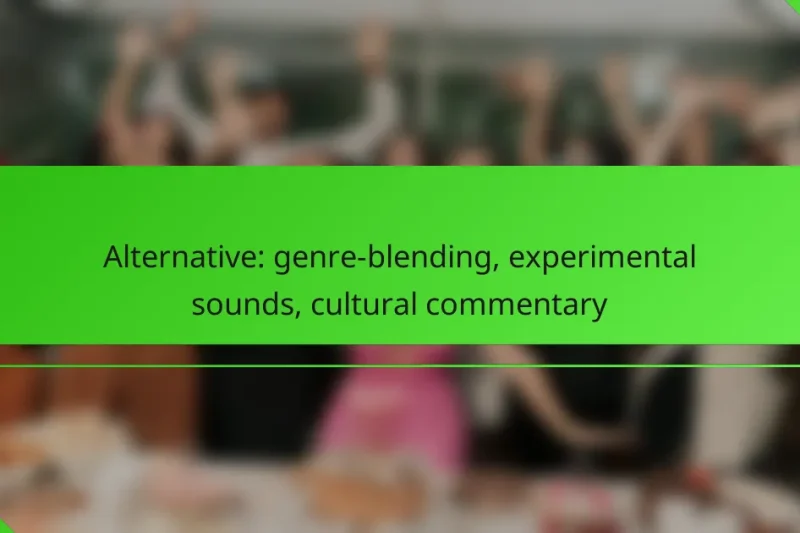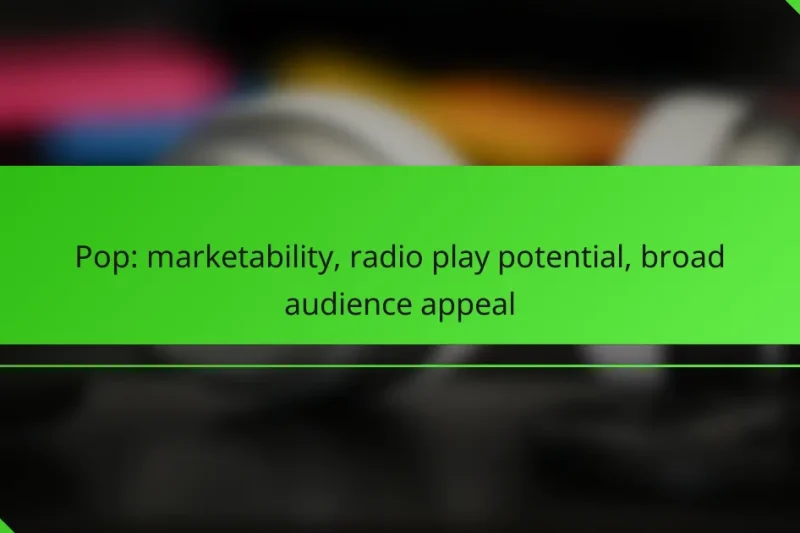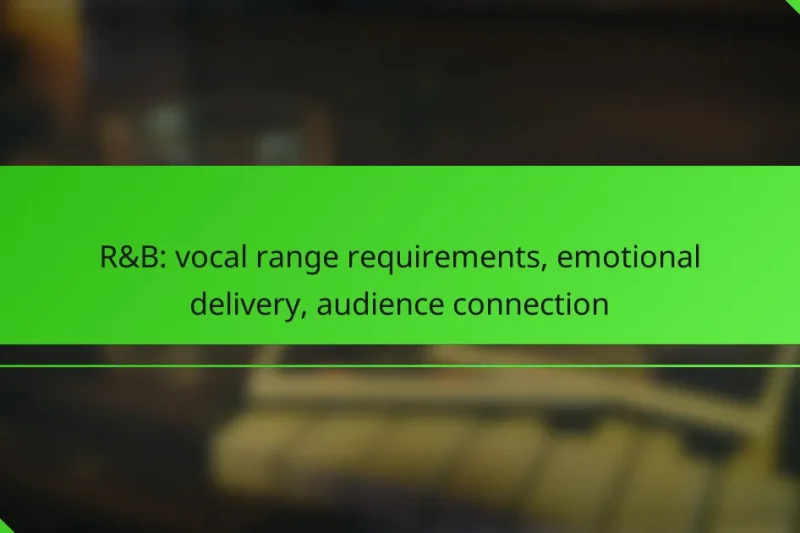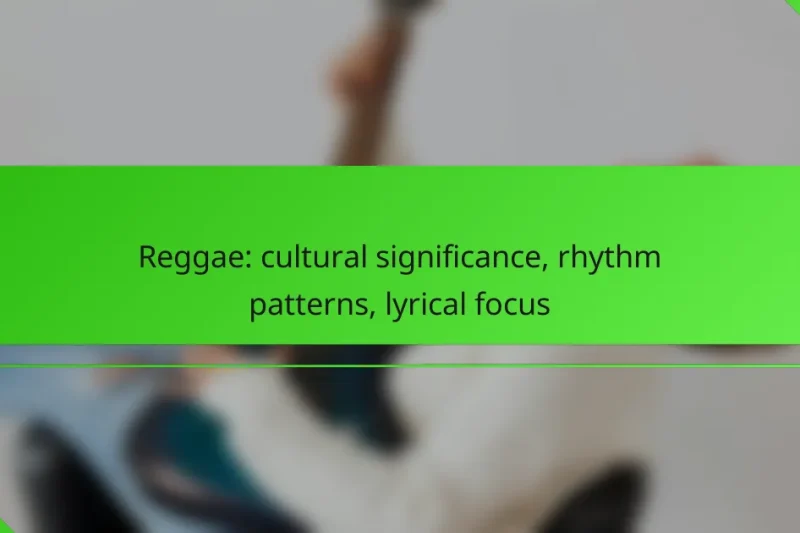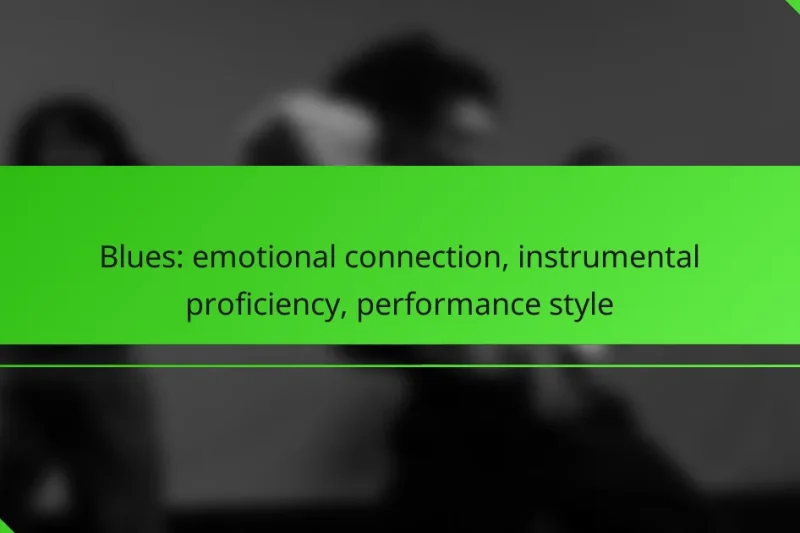In the realm of contemporary music, genre-blending albums are at the forefront, merging diverse styles and … Alternative: genre-blending, experimental sounds, cultural commentaryRead more
Choosing the Right Music Genre for Your Needs
Choosing the right music genre can significantly enhance your experience, whether for an event or personal enjoyment. By understanding the diverse range of genres, such as pop, indie rock, hip-hop, and country, you can select music that resonates with your audience and suits the occasion. Additionally, recognizing the benefits of different genres can help you tailor your music choices to boost mood, productivity, or relaxation based on your specific needs.
Indie: artistic freedom, niche markets, experimental elements
Indie artists thrive on artistic freedom, enabling them to explore unique visions and connect authentically with … Indie: artistic freedom, niche markets, experimental elementsRead more
Pop: marketability, radio play potential, broad audience appeal
Pop music’s marketability hinges on a variety of factors that signal a song’s potential for commercial … Pop: marketability, radio play potential, broad audience appealRead more
Jazz: improvisation opportunities, skill level, collaboration potential
Jazz is a unique genre that thrives on improvisation, offering musicians a platform to express their … Jazz: improvisation opportunities, skill level, collaboration potentialRead more
R&B: vocal range requirements, emotional delivery, audience connection
R&B singers often showcase a vocal range from A2 to A5, allowing them to convey a … R&B: vocal range requirements, emotional delivery, audience connectionRead more
Reggae: cultural significance, rhythm patterns, lyrical focus
Reggae is a powerful musical genre that not only shapes cultural identity but also fosters community … Reggae: cultural significance, rhythm patterns, lyrical focusRead more
Metal: fan base loyalty, performance intensity, subgenre specifics
Metal music boasts a fiercely loyal fan base, where deep connections among fans, artists, and the … Metal: fan base loyalty, performance intensity, subgenre specificsRead more
Electronic: venue requirements, audience demographics, technology use
When planning electronic events in Canada, it is essential to consider venue requirements such as capacity, … Electronic: venue requirements, audience demographics, technology useRead more
Blues: emotional connection, instrumental proficiency, performance style
Blues music serves as a powerful medium for emotional connection, allowing artists to share deep feelings … Blues: emotional connection, instrumental proficiency, performance styleRead more
Punk: attitude and ethos, DIY approach, live performance energy
Punk culture embodies a rebellious spirit and a commitment to authenticity, fostering a DIY ethos that … Punk: attitude and ethos, DIY approach, live performance energyRead more
What music genres are popular in Canada?
In Canada, popular music genres include pop, indie rock, hip-hop, country, and electronic dance music. These genres reflect diverse cultural influences and resonate with various audiences across the country.
Pop music trends
Pop music in Canada is characterized by catchy melodies and relatable lyrics, often featuring artists who achieve significant radio play and streaming success. Current trends include collaborations between pop and other genres, such as hip-hop and electronic music, which broaden appeal and reach. Notable Canadian pop artists like Justin Bieber and Shawn Mendes have contributed to the genre’s popularity.
Indie rock influences
Indie rock in Canada showcases a blend of alternative sounds and DIY ethics, often emphasizing artistic expression over commercial success. This genre has gained traction through festivals like the Toronto Indie Music Festival, where emerging artists can showcase their work. Bands such as Arcade Fire and Metric exemplify the unique Canadian indie rock scene.
Hip-hop growth
Hip-hop has seen remarkable growth in Canada, with artists gaining international recognition and contributing to the genre’s evolution. The rise of platforms like SoundCloud has allowed Canadian hip-hop artists to reach wider audiences, leading to a vibrant scene. Artists such as Drake and The Weeknd have played pivotal roles in popularizing Canadian hip-hop on the global stage.
Country music appeal
Country music maintains a strong appeal in Canada, particularly in rural areas and among specific demographics. Canadian country artists often blend traditional sounds with contemporary influences, creating a unique style that resonates with fans. Festivals like Boots and Hearts highlight the genre’s popularity, showcasing both local and international talent.
Electronic dance music rise
Electronic dance music (EDM) has gained significant traction in Canada, driven by a vibrant festival culture and a growing number of local DJs and producers. Events like the Electric Daisy Carnival attract large crowds, showcasing the genre’s popularity. Canadian artists such as Deadmau5 and Zeds Dead have made substantial contributions to the global EDM scene.
How to choose a music genre for events?
Choosing the right music genre for events involves understanding your audience, the type of event, and the venue’s characteristics. Selecting a genre that resonates with attendees can enhance their experience and create a memorable atmosphere.
Consider audience demographics
Understanding the demographics of your audience is crucial when selecting a music genre. Consider factors such as age, cultural background, and preferences, as these can significantly influence their musical tastes. For example, younger audiences may prefer pop or electronic music, while older attendees might enjoy classic rock or jazz.
Gathering feedback through surveys or social media can help gauge the musical preferences of your audience. This insight allows you to tailor your music selection to better suit their expectations and enhance engagement.
Match genre to event type
The type of event plays a significant role in determining the appropriate music genre. For formal gatherings like weddings or corporate events, genres such as classical or smooth jazz may be more suitable. In contrast, lively parties or festivals often call for upbeat genres like pop, dance, or hip-hop.
Consider the event’s purpose and mood when selecting a genre. For instance, a networking event may benefit from background music that fosters conversation, while a celebration may require more energetic tracks to encourage dancing.
Evaluate venue acoustics
Venue acoustics can greatly affect how music is perceived, making it essential to consider this aspect when choosing a genre. Different genres may sound better in specific environments; for example, live bands may thrive in smaller, intimate spaces, while DJs might be more effective in larger venues with ample sound systems.
Before finalizing your music selection, assess the venue’s layout and acoustics. If possible, conduct a sound check to determine how different genres resonate within the space. This evaluation can help ensure that the music enhances the overall experience rather than detracting from it.
What are the benefits of different music genres?
Different music genres offer various benefits that can enhance mood, productivity, and relaxation. Understanding these benefits helps you choose the right genre for your specific needs, whether it’s for studying, exercising, or unwinding.
Emotional impact of classical music
Classical music is known for its profound emotional resonance, often evoking feelings of calmness and introspection. The intricate compositions can stimulate the brain, making it an excellent choice for tasks requiring focus and creativity.
Listening to classical pieces, especially those with slower tempos, can lower stress levels and promote relaxation. Consider incorporating composers like Bach or Mozart into your routine when you need to concentrate or unwind.
Energy levels in rock music
Rock music is characterized by its high energy and rhythmic intensity, making it ideal for boosting motivation during workouts or high-energy activities. The driving beats and powerful vocals can elevate heart rates and enhance physical performance.
When choosing rock music for exercise, look for tracks with a tempo of around 120-140 beats per minute to maintain an energetic pace. However, be mindful of the volume, as prolonged exposure to loud music can lead to hearing damage.
Relaxation from jazz
Jazz music is often associated with relaxation and a laid-back atmosphere, making it perfect for unwinding after a long day. The improvisational nature of jazz creates a soothing soundscape that can help reduce anxiety and promote a sense of peace.
To fully enjoy the calming effects of jazz, consider listening to artists like Miles Davis or John Coltrane during quiet evenings or while engaging in leisure activities. Aim for softer sub-genres, such as smooth jazz, to enhance the relaxing experience.
How do music genres affect mood?
Music genres significantly influence mood by evoking specific emotional responses. Different styles can uplift, calm, or motivate listeners, making it essential to choose the right genre for your needs.
Uplifting effects of pop
Pop music is known for its catchy melodies and upbeat rhythms, which can elevate mood and energy levels. The repetitive structures and positive lyrics often create a sense of joy and excitement, making pop a popular choice for celebrations and social gatherings.
When selecting pop songs, consider those with fast tempos and major keys, as they are more likely to enhance feelings of happiness. For instance, tracks from artists like Dua Lipa or Bruno Mars can instantly boost your spirits.
Calming influence of ambient
Ambient music is designed to create a soothing atmosphere, often characterized by slow tempos and gentle sounds. This genre can help reduce stress and anxiety, making it ideal for relaxation or meditation.
To effectively use ambient music, look for tracks that feature natural sounds or minimalistic compositions. Artists like Brian Eno or Tycho provide excellent examples of ambient music that can help create a tranquil environment.
Motivational power of hip-hop
Hip-hop often incorporates strong beats and powerful lyrics that can inspire and energize listeners. This genre is frequently used in workout playlists or motivational settings, as it can drive performance and enhance focus.
When choosing hip-hop tracks for motivation, consider those with anthemic choruses or empowering messages. Songs by artists like Kanye West or Cardi B can provide the boost needed to tackle challenges or stay energized during physical activities.
What are the key characteristics of each genre?
Each music genre has distinct characteristics that define its sound and appeal. Understanding these traits can help you choose the right genre for your specific needs, whether for relaxation, celebration, or background ambiance.
Instrumentation in folk music
Folk music typically features acoustic instruments that create a warm, organic sound. Common instruments include the guitar, banjo, fiddle, and harmonica, often played in a simple, melodic style that emphasizes storytelling.
When selecting folk music, consider the instrumentation that resonates with your audience. For instance, a guitar-driven folk song may evoke a sense of nostalgia, while a lively fiddle tune can energize a gathering.
Rhythm patterns in reggae
Reggae is characterized by its offbeat rhythm patterns, often referred to as the “one drop” or “rockers” style. This rhythmic structure creates a laid-back groove that encourages relaxation and enjoyment.
When choosing reggae music, pay attention to the tempo and feel. Songs with a slower tempo can be great for chilling out, while faster tracks can uplift and energize a crowd. Aim for a mix that suits the atmosphere you want to create.
Lyrical themes in R&B
R&B lyrics often explore themes of love, heartbreak, and personal experiences, delivered with emotional depth. The genre combines storytelling with a smooth vocal style, making it relatable and engaging.
For an effective R&B selection, focus on songs that resonate with the emotions you want to convey. Whether it’s a romantic ballad or an upbeat anthem about empowerment, the lyrical content should align with the mood of your event.
How to explore new music genres?
Exploring new music genres involves actively seeking out different styles and understanding their unique characteristics. Start by listening to curated playlists, attending live performances, or using music discovery apps to broaden your musical horizons.
Identify your current favorites
Begin by listing the music genres you already enjoy. This helps you find related genres that share similar elements, such as tempo, instrumentation, or themes. For instance, if you love rock, you might explore alternative rock or punk.
Consider the emotional response you have to your favorite songs. Genres like blues or jazz may resonate if you appreciate soulful melodies, while electronic music might appeal if you enjoy upbeat rhythms.
Use music streaming services
Many music streaming platforms offer personalized recommendations based on your listening habits. Services like Spotify or Apple Music provide genre-based playlists and radio stations that can introduce you to new sounds. Take advantage of features like “Discover Weekly” or “For You” to find fresh tracks.
Engage with the algorithms by liking songs and creating playlists. This interaction helps refine recommendations, making it easier to uncover genres that align with your tastes.
Attend live music events
Live music events are a great way to experience new genres in an immersive environment. Look for local concerts, festivals, or open mic nights that feature diverse acts. This not only exposes you to different styles but also allows you to connect with fellow music lovers.
Consider attending genre-specific events, such as jazz nights or folk festivals, to dive deeper into those musical styles. Engaging with artists and audiences can enhance your appreciation and understanding of the genre.
Join online music communities
Participating in online forums or social media groups dedicated to music can help you discover new genres. Platforms like Reddit, Facebook, or specialized music forums allow users to share recommendations and discuss their favorite styles.
Ask for suggestions based on your current favorites and be open to exploring what others recommend. Engaging in discussions can provide insights into the history and cultural significance of various genres.
